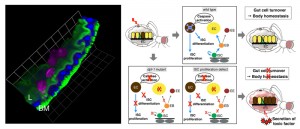The gut works as a body stress sensor Role of gut in stress-sensing for maintaining body homeostasis

Effective defense responses involve the entire organism. To maintain body homeostasis after tissue damage, a systemic wound response including inflammatory response is induced in which the response of each tissue is tightly orchestrated.

© Masayuki Miura. Cuticle wounding induces caspase activation and apoptosis in the midgut epithelia, an organ distant from the wounded site. L: lumen, BM: basement membrane, blue: Hoechst, magenta: caspase-activated cells.
A research group including Professor Masayuki Miura and postdoctoral researcher Asuka Takeishi at the University of Tokyo’s Graduate School of Pharmaceutical Sciences together with Erina Kuranaga, a team leader at RIKEN Center for Developmental Biology, revealed a novel mechanism responsible for maintaining body homeostasis. The gut plays an important role sensing systemic stress induced by wounding, which is followed by gut-cell regeneration via activation of intestinal stem cells.
They demonstrated that the gut functions as a stress-sensor to detect external stresses and to induce stress responses in the fruit fly. During theses stress responses, activated cells of the gut epithelia induce gut stem cell proliferation and undergo apoptosis rapidly for the proper gut epithelial renewal and fly survival. Their results indicate that wounding remotely controls the activation of stem cells to induce tissue regeneration, which mechanism is similar to the neural stem cells in the mammalian adult brain which have the potential to activate after ischemia.
Their research uncovered a novel mechanism maintaining body homeostasis: systemic stress responses induce tissue stem cell activation. This finding offers clues to enable a genetic approach to identify the molecular mechanisms underlying the link between systemic stress response and stem cell activation.
Press release (Japanese)
Paper
Takeishi, A., Kuranaga, E., Tonoki, A., Misaki, K., Yonemura, S., Kanuka, H., Miura, M.,
“Homeostatic epithelial renewal in the gut is required to dampen a fatal systemic wound response in Drosophila”,
Cell Reports 3, 919-930, 2013, doi: 10.1016/j.celrep.2013.02.022.
Article link
Links
Graduate School of Pharmaceutical Sciences
Department of Genetics, Graduate School of Pharmaceutical Sciences







